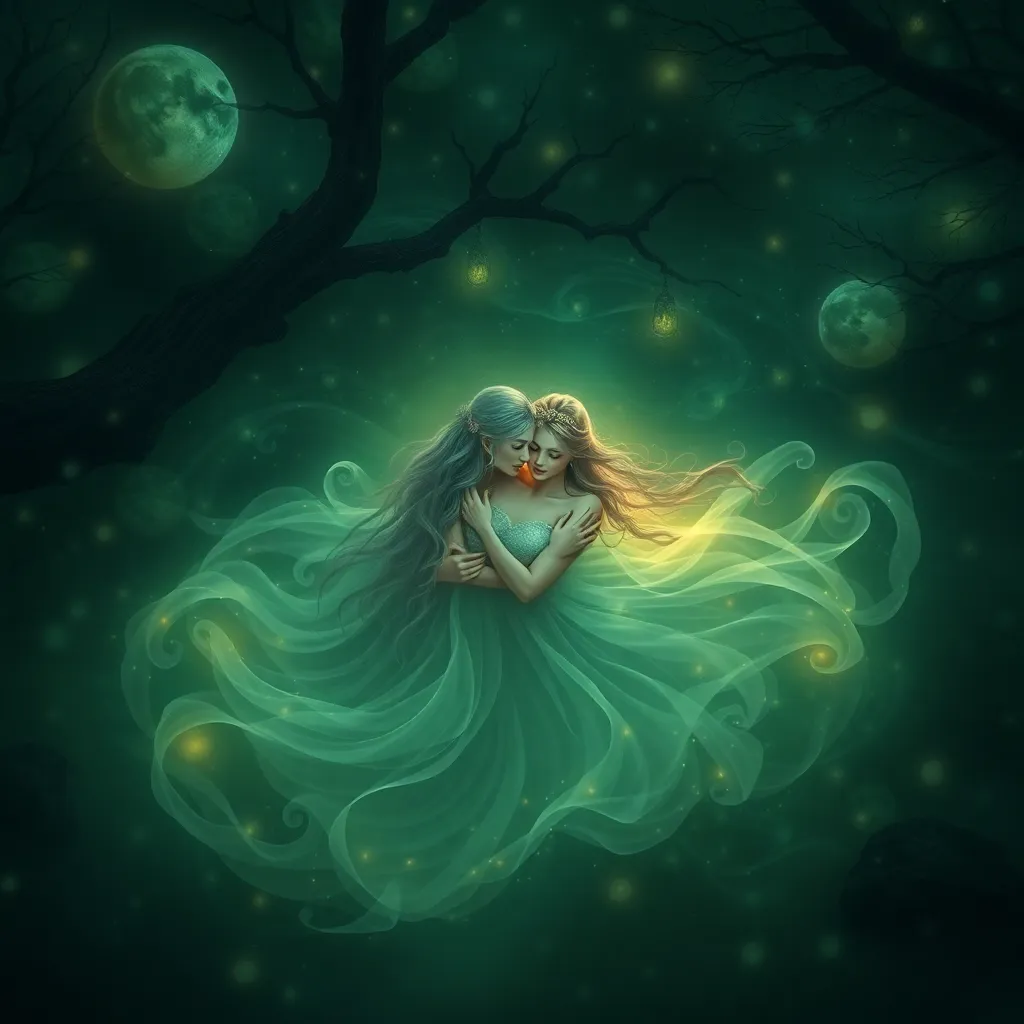The Rusalka’s Embrace: Examining Themes of Love, Loss, and Redemption in Rusalka Tales
I. Introduction to Rusalka Tales
Rusalka tales are a captivating part of Slavic folklore, featuring enchanting water nymphs known as Rusalkas. Traditionally depicted as beautiful young women with long flowing hair, these mythical beings are often associated with rivers, lakes, and other bodies of water. The origins of Rusalka tales can be traced back to ancient Slavic beliefs, where Rusalkas were thought to be the spirits of young women who died tragically, often due to unfulfilled love or untimely death.
The significance of the Rusalka in Slavic mythology cannot be understated; she embodies the complexities of love, the pain of loss, and the hope of redemption. These stories resonate deeply within the cultural psyche, reflecting both the beauty and tragedy of human emotion. This article will delve into the recurring themes of love, loss, and redemption found in Rusalka tales, exploring how these elements intertwine to create poignant narratives that have transcended generations.
II. The Concept of Love in Rusalka Narratives
At the heart of Rusalka tales is the concept of love, which is portrayed in various forms. Romantic love is often central to these narratives, showcasing the passionate connections between Rusalkas and their human counterparts.
A. Romantic love and its portrayal in various Rusalka tales
In many stories, the Rusalka’s love for a human man leads to both enchantment and tragedy. For example, in the tale of “Rusalka,” a beautiful water nymph falls in love with a prince, who ultimately forgets her in the pursuit of societal expectations and earthly desires. This unfulfilled love often results in devastating consequences for both characters.
B. The duality of love: passion versus obsession
The love depicted in Rusalka tales often reflects a duality—where passion can tip into obsession. For instance, a Rusalka may become so infatuated with her lover that she is willing to sacrifice her very essence for a chance to be with him. This obsession can lead to destructive choices, showcasing how love, while beautiful, can also be perilous.
C. The transformative power of love on both Rusalka and humans
Love has the power to transform both the Rusalka and the humans involved. It can elevate their spirits, making them feel alive, yet it can also lead to their downfall. The emotional journey of love in these tales often results in significant character development, revealing the depth of human and supernatural experiences.
III. Exploring Themes of Loss
Loss is a prevalent theme in Rusalka tales, representing not only the loss of life but also the loss of identity and connection.
A. Loss of identity: Rusalka’s transformation and its implications
The transformation from a human to a Rusalka is often marked by a profound loss of identity. This change signifies a departure from the mundane world, resulting in a struggle between their former human selves and their new, ethereal existence. This loss is emblematic of the sacrifices made in the name of love.
B. Grief and longing in the human characters
Human characters in Rusalka tales often experience deep grief and longing for their lost loves. The emotional impact of losing a Rusalka can manifest in various ways, including isolation, despair, and an unending search for closure. These narratives reflect the human condition, emphasizing how loss can shape relationships and personal journeys.
C. The impact of loss on relationships and the environment
- Loss can fracture relationships, leading to resentment and sorrow among those left behind.
- The environment often mirrors this sense of loss, with desolate landscapes representing the emotional void left in the wake of tragedy.
- As Rusalkas are linked to natural bodies of water, their absence can symbolize ecological as well as emotional desolation.
IV. Redemption Arcs in Rusalka Stories
Redemption is a critical aspect of Rusalka tales, offering hope amidst despair and illustrating the possibility of healing.
A. The journey from despair to hope
Many Rusalka narratives include a journey where characters transition from despair into hope. This journey often involves self-discovery and confronting painful truths about love and loss.
B. Redemption through sacrifice: Rusalka’s choices
Rusalkas often face dilemmas that require sacrifice for the sake of love. Their choices highlight the theme of redemption, where they may seek to save their beloved or restore balance between the human and supernatural worlds. These sacrifices are poignant reminders of love’s complexities.
C. The role of forgiveness in healing and restoration
Forgiveness plays a vital role in the healing process depicted in Rusalka tales. Characters must learn to forgive themselves and others for past mistakes, which paves the way for restoration and renewal. This theme underscores the importance of compassion in overcoming grief and loss.
V. Symbolism of Water in Rusalka Tales
Water serves as a powerful symbol in Rusalka tales, representing emotions, the subconscious, and the cycle of life and death.
A. Water as a representation of emotions and the subconscious
Water is often associated with the depths of human emotion, illustrating the fluidity and unpredictability of feelings. The Rusalka’s connection to water emphasizes the idea that emotions can be both beautiful and dangerous.
B. The connection between water, life, and death
Water symbolizes the interconnectedness of life and death. In Rusalka tales, the water serves as a boundary between the two realms, where the dead may linger and love can transcend mortality.
C. The cyclical nature of love and loss reflected in water motifs
The cyclical motifs of water—its ebb and flow—reflect the ongoing nature of love and loss. Just as rivers flow and change, so do human emotions, highlighting the transient yet recurring nature of relationships.
VI. Cultural Variations of Rusalka Legends
The Rusalka tales vary across different Slavic cultures, each region adding unique elements that enrich the overall narrative.
A. Comparison of Rusalka tales across different Slavic cultures
While the core themes remain consistent, variations in Rusalka stories can be observed. For example, in some cultures, Rusalkas are seen as benevolent spirits, while in others, they are portrayed as vengeful entities.
B. Influence of historical context on themes of love and loss
Historical contexts significantly influence how love and loss are depicted in Rusalka tales. Societal norms, wars, and cultural shifts shape the narratives, making them relevant to the experiences of the time.
C. How regional variations enrich the understanding of redemption
Regional variations provide a broader understanding of redemption arcs in Rusalka tales. Each culture’s perspective on forgiveness, sacrifice, and healing adds depth to the narratives, revealing the universal nature of these themes.
VII. Modern Adaptations and Interpretations
In recent years, Rusalka tales have seen a resurgence in contemporary literature and media, reflecting their timeless appeal.
A. The resurgence of Rusalka tales in contemporary literature and media
Modern adaptations often reimagine Rusalka stories through various media, including literature, film, and theater. These retellings bring fresh perspectives while maintaining the essence of the original folklore.
B. Themes of love, loss, and redemption in modern retellings
Contemporary adaptations explore the same timeless themes of love, loss, and redemption but often with modern sensibilities. Writers and creators delve into the complexities of relationships in today’s world, making the stories relatable to new audiences.
C. The relevance of Rusalka stories in today’s societal context
Rusalka tales continue to resonate in today’s society, reflecting ongoing struggles with love, identity, and emotional healing. They serve as a reminder of the importance of connection and the profound impact of our choices on ourselves and others.
VIII. Conclusion: The Lasting Legacy of Rusalka Tales
In summary, Rusalka tales offer rich narratives that explore the intricate themes of love, loss, and redemption. Through the lens of Slavic folklore, we gain insight into the human condition, highlighting the beauty and tragedy of our emotional experiences.
The enduring



